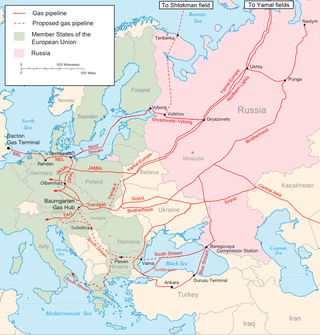Related Research Articles

PJSC Gazprom is a Russian majority state-owned multinational energy corporation headquartered in the Lakhta Center in Saint Petersburg. The Gazprom name is a contraction of the Russian words gazovaya promyshlennost. In January 2022, Gazprom displaced Sberbank from the first place in the list of the largest company in Russia by market capitalization. In 2022, the company's revenue amounted to 8 trillion rubles.

Transnistria, officially known as the Pridnestrovian Moldavian Republic and locally as Pridnestrovie, is a landlocked breakaway state internationally recognized as part of Moldova. It controls most of the narrow strip of land between the Dniester river and the Moldova–Ukraine border, as well as some land on the other side of the river's bank. Its capital and largest city is Tiraspol. Transnistria is officially designated by the Republic of Moldova as the Administrative-Territorial Units of the Left Bank of the Dniester or as Stînga Nistrului.
The Shtokman field, one of the world's largest natural gas fields, lies in the northwestern part of the South Barents Basin in the Russian sector of the Barents Sea, 600 kilometres (370 mi) north of Kola Peninsula. Its reserves are estimated at 3.8 trillion cubic metres of natural gas and more than 37 million tons of gas condensate.

The Russia–Ukraine gas disputes refer to a number of disputes between Ukrainian oil and gas company Naftogaz Ukrayiny and Russian gas supplier Gazprom over natural gas supplies, prices, and debts. These disputes have grown beyond simple business disputes into transnational political issues—involving political leaders from several countries—that threaten natural gas supplies in numerous European countries dependent on natural gas imports from Russian suppliers, which are transported through Ukraine. Russia provides approximately a quarter of the natural gas consumed in the European Union; approximately 80% of those exports travel through pipelines across Ukrainian soil prior to arriving in the EU.

Polskie Górnictwo Naftowe i Gazownictwo S.A., abbreviated to PGNiG, was a Polish state-controlled oil and gas company, headquartered in Warsaw, Poland. The company has branches and representative offices in Russia, Pakistan, Belarus and Ukraine and holds equity interests in some 30 subsidiaries, including providers of specialist geophysical, drilling and well services.

The Russia–Belarus energy dispute began when Russian state-owned gas supplier Gazprom demanded an increase in gas prices paid by Belarus, a country which has been closely allied with Moscow and forms a loose union state with Russia. It escalated on 8 January 2007, when the Russian state-owned pipeline company Transneft stopped pumping oil into the Druzhba pipeline which runs through Belarus because Belarus was siphoning the oil off the pipe without mutual agreement. On 10 January, Transneft resumed oil exports through the pipeline after Belarus ended the tariff that sparked the shutdown, despite differing messages from the parties on the state of negotiations.

The gas-fired Cuciurgan power station, the largest power station in Moldova, is located in Transnistria, on the shores of the Cuciurgan Reservoir bordering Ukraine. As of 2024 it generates over three quarters of Moldova's electricity. Commissioned in 1964, it formerly burned some coal and fuel oil.
The Trans-Balkan pipeline is a natural gas pipeline between Turkey and Ukraine with branches to Greece and North Macedonia. It was used by Gazprom for gas deliveries through Balkan countries to Turkey. Before construction of the Blue Stream pipeline it was the only international natural gas pipeline supplying Turkey.

Power of Siberia is a Gazprom-operated pipeline in Eastern Siberia that transports natural gas from Yakutia to Primorsky Krai and China. It is a part of the eastern gas route from Siberia to China. The proposed western gas route to China is known as Power of Siberia 2.

The 2005–06 Russia–Ukraine gas dispute was between Ukrainian state-controlled oil and gas company Naftogaz Ukrainy and Russian national gas supplier Gazprom. The disagreements concerned natural gas supplies, prices and debts. The conflict started in March 2005, ended in January 2006 and, in addition to the gas companies, involved politicians from both countries.

With few natural energy resources, Moldova imports almost all of its energy supplies. 50% of the country's national energy company, Moldovagaz, is owned by Russian oil and natural gas supplier Gazprom, the remaining 36% split between the Moldovan government (36.6%) and the unrecognised government of Transnistria (13.4%). Moldova's historic dependence on Russian energy is underscored by a debt of more than US$709 million to Gazprom as well as a further US$7 billion by Transnistria. Russia supplies the breakaway pro-Russian region with oil and natural gas without requiring them to pay, with the cost levied as debt against the Moldovan state as a form of economic warfare. The Moldovan government disputes the figures, and has identified more than US$100 million in fraudulent claims by Gazprom.
TurkStream is a natural gas pipeline running from Russia to Turkey. It starts from Russkaya compressor station near Anapa in Russia's Krasnodar Region, crossing the Black Sea to the receiving terminal at Kıyıköy. Some gas flows onwards to the European Union.

Uniper SE is a German multinational energy company based in Düsseldorf, Germany, which has been a state-owned enterprise since late 2022. It is one of the biggest energy companies by revenue in Europe. The name of the company is a portmanteau of "unique" and "performance", which was given by long-term employee Gregor Recke. Uniper was formed by the separation of E.ON's fossil fuel assets into a separate company that began operating on 1 January 2016. In 2019, the company employed about 6,800 people in over 40 countries. In 2018, around one-third of the employees were based in Germany. Until 2022, it owned a subsidiary company in Russia called Unipro. Uniper was listed on the Frankfurt Stock Exchange.

The natural gas transmission system of Ukraine is a complex of pipelines for import and transit of gas in Ukraine. It is one of the largest gas transmission systems in the world. The system is linked with the systems of Poland, Romania, Moldova, Hungary and Slovakia, and was formerly linked with the natural gas transmission systems of Russia and Belarus. The system is owned by Government of Ukraine and operated by Gas Transmission System Operator of Ukraine. Some local transmission lines together with distribution sets are owned by regional gas companies.

Natural gas supplies over a quarter of Turkey's energy. The country consumes 50 to 60 billion cubic metres of this natural gas each year, nearly all of which is imported. A large gas field in the Black Sea however started production in 2023.
Events in the year 2022 in Bulgaria.

The Russia–EU gas dispute flared up in March 2022 following the invasion of Ukraine on 24 February 2022. Russia and the major EU countries clashed over the issue of payment for natural gas pipelined to Europe by Russia's Gazprom, amidst sanctions on Russia that were expanded in response to Russia's 2022 invasion of Ukraine. In June, Gazprom claimed it was obliged to cut the flow of gas to Germany by more than half, as a result of such sanctions that prevented the Russian company from receiving its turbine component from Canada. On 26 September 2022, three of the four pipes of the Nord Stream 1 and 2 gas pipelines were sabotaged. This resulted in a record release of 115,000 tonnes of methane (CH4) – an equivalent of 15 million tonnes of carbon dioxide (CO2) – and is believed to have made a contribution to global warming.
The 2021–2022 global energy crisis has caused varying effects in different parts of the world.
Starting in late 2022, Moldova suffered an energy crisis, the worst since its independence. Hugely influenced by the Russian invasion of Ukraine, caused when Russia's Gazprom reduced supplies.

On 31 December 2024, at 19:50 EET, Moldova's unrecognized breakaway region of Transnistria stopped receiving natural gas supplies from Russia when Ukraine's gas transit deal with Russia expired. Historically, Transnistria had covered most of Moldova's electricity needs through the Cuciurgan power station, which functioned with Russian gas supplied to Transnistria for free. However, with the termination of Russian gas supplies to Transnistria and the end of Moldovan purchases of Transnistrian electricity, the possibility of a humanitarian crisis in Transnistria has arisen, which could potentially lead to the collapse of the breakaway state and its reintegration into Moldova. Three people have died in Transnistria since the start of the energy crisis due to carbon monoxide poisoning.
References
- 1 2 "Moldova prepares for possible Moldovagaz nationalisation". Reuters. December 30, 2024.
- ↑ "Russia's Gazprom says it will halt gas supplies to Moldova starting Jan. 1". AP News. 2024-12-28. Retrieved 2025-01-01.
- ↑ "Russia says it will stop supplying Moldova with gas next week". euronews. 2024-12-28. Retrieved 2025-01-01.
- ↑ "Moldovan PM orders preparing energy company Moldovagaz nationalization". Interfax-Ukraine. Retrieved 2025-01-01.